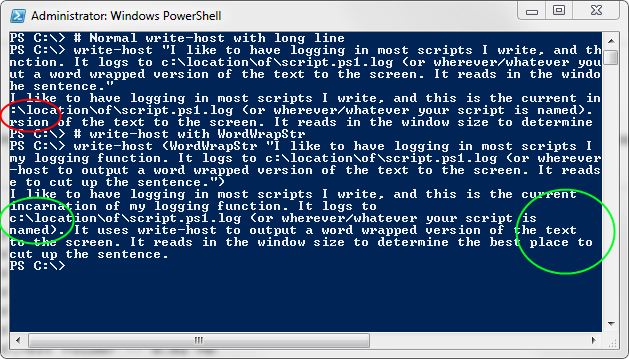I like to have logging in most scripts I write, and this is the current incarnation of my logging function. It logs to c:\location\of\script.ps1.log (or wherever/whatever your script is named). It uses write-host to output a word wrapped version of the text to the screen. It reads in the window size to determine the best place to cut up the sentence.
# Name of the currently executing script $ScriptName = $MyInvocation.MyCommand.Path # Simple log file name, OurScriptName.ps1.log $LogFile = $ScriptName + ".log" # Word wrap function, return word wrapped version of passed string function WordWrapStr($str) { # Holds the final version of $str with newlines $strWithNewLines = "" # current line, never contains more than screen width $curLine = "" # Loop over the words and write a line out just short of window size foreach ($word in $str.Split(" ")) { # Lets see if adding a word makes our string longer then window width $checkLinePlusWord = $curLine + " " + $word if ($checkLinePlusWord.length -gt (get-host).ui.rawui.windowsize.width) { # With the new word we've gone over width # append newline before we append new word $strWithNewLines += [Environment]::Newline # Reset current line $curLine = "" } # Append word to current line and final str $curLine += $word + " " $strWithNewLines += $word + " " } # return our word wrapped string return $strWithNewLines } # Log function, append passed string to log file function Log([string]$logline) { $timestamp = Get-Date -f "yyyy-MM-dd HH:mm:ss" $StdLogLine = "$timestamp> $logline" # Add the log line to our log file in ascii with timestamp Add-Content $LogFile $StdLogLine -encoding ascii # Print to the screen the word wrapped version (no timestamp) write-host (WordWrapStr $logline) } Log "This text will first be appended to $LogFile, ascii encoded. Also cut up the text and print it out word wrapped to the screen. It works even with really long lines." |
Example with and without word wrapped write-host:

